I often find myself repeating the same thing to clients: don’t incentivize reviews—it’s against Google policy. But understandably, many business owners push back. They see their competitors doing it, and they hear me emphasize how important it is to consistently generate new reviews to perform well in the local pack.
The truth is, businesses know how critical reviews are. So they start encouraging their teams to ask for them, and it becomes part of the company culture. And to be clear—there’s nothing wrong with asking for an honest review. The problem begins when incentives enter the equation or when customers start feeling pressured. That’s where it crosses the line and violates Google’s guidelines.
So how do you find the balance?
And here’s the bigger question: Is Google actually going to enforce these guidelines? Let’s be honest—what Google says is “against policy” doesn’t always seem to apply equally to everyone. Maybe it’s inconsistent training across AI models. Maybe it’s a language barrier with overseas teams reviewing the data. No one really knows.
But this new “badge of shame” Google has started displaying? It feels different.
Why? Because of the new consumer protection laws coming out of the UK. Platforms like Google are now under pressure to show that they have proper systems in place to detect and remove fake reviews, or risk serious financial penalties.
So, could this be the beginning of a review revolution? Probably not. But it might just be the start of something important.
The challenge now is educating small businesses to rethink their approach. What seems innocent—like rewarding a happy customer with a discount, can actually violate Google’s terms. And most small business owners aren’t trying to game the system. They’re just trying to keep up, often without realizing that their tactics could do more harm than good.
Legal Pressure Could Be Driving Google’s New Review Warnings
Could Google be warning businesses that the days of gaming the review system are coming to an end? With new consumer protection laws now in effect in the UK, Google and other platforms may soon face legal pressure, including fines, to act more aggressively against review fraud. Under the Digital Markets, Competition and Consumers Act, companies like Google are expected to take responsibility to monitor and eliminate fake reviews from being published.
“This could include, for example, having adequate detection and removal procedures in place to prevent fake reviews being published.”
— UK Government
To combat fake reviews, Google has rolled out “consumer alerts” under its Maps User Generated Content Policy—part of a broader push for review integrity, stricter enforcement, and warn of public banners on Business Profiles suspected of review fraud.
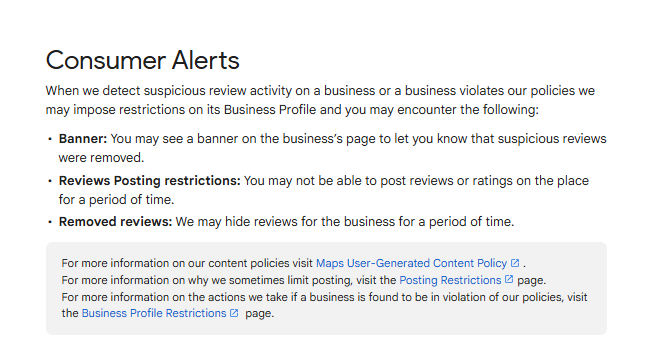
What makes this different from previous spam filters? For one, Gemini can now retroactively analyze reviews and detect new abuse patterns that may have gone unnoticed at the time of posting. This means reviews that seemed legitimate months ago may now be flagged, removed, and even lead to public profile restrictions.
Visual warnings such as:
“Suspected fake reviews were recently removed from this place”
“Posting reviews is turned off for this place”
are already appearing on profiles affected by these enforcement actions. These alerts are front and center, visible to anyone searching your business.
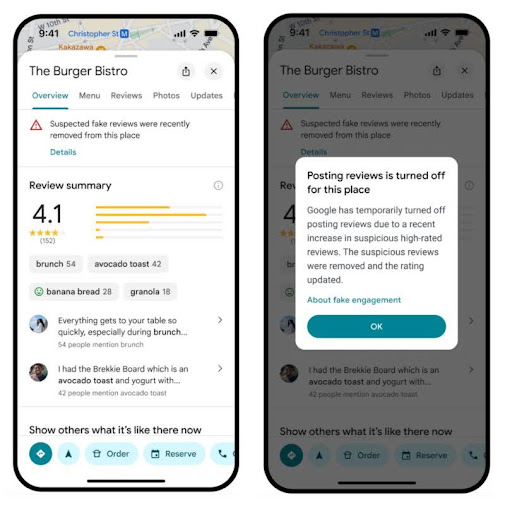
What Happens If Google Flags Your Business?
If Google determines that a business has violated its Fake Engagement policy, it may apply restrictions to the Business Profile, beyond just removing suspicious reviews. These restrictions can include:
- Blocking new reviews and ratings for a set period of time
- Temporarily unpublishing existing reviews and ratings
- Displaying a public warning on the profile indicating that fake reviews were removed
- Email notification to the business owner detailing the restriction being applied
These restrictions are public and can seriously hurt your credibility and visibility in local search. Fresh, authentic reviews play a key role in boosting rankings, so losing the ability to collect them is a competitive setback.
Your Competitor or Customer Could Be the One to Report You
It’s not just Google’s AI you need to worry about. A competitor or even a customer can report your business for violating Google’s review policies. If you’re openly offering discounts or incentives for reviews, whether it’s on your counter, website, or social media, it’s easy for someone to flag you using this reporting tool.
And let’s be honest: if a competitor is playing by the rules and sees you climbing the rankings through shady tactics, don’t assume they’ll look the other way. One clear screenshot is all it takes to put your profile on Google’s radar.
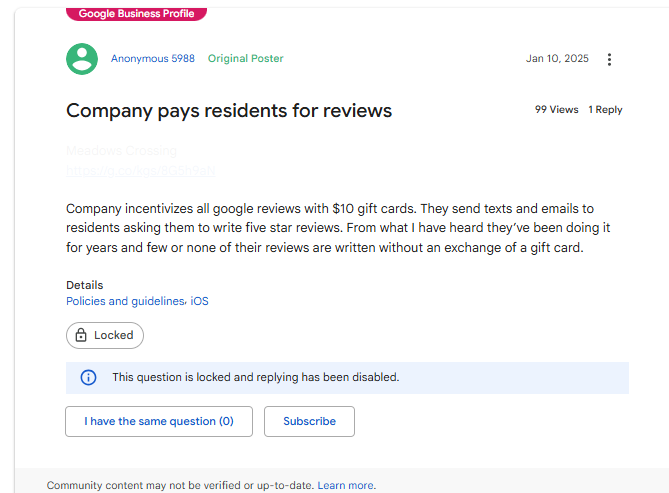
Manipulating Reviews Comes at a Cost
An honest five-star review is one of the most powerful ways customers can support a business. But when businesses try to manipulate their reputation by encouraging “Fake engagement,” whether through paid reviews, review gating, or promotional incentives, they risk more than just content removal. They could face consequential restrictions on their Google Business Profile.
Google’s Big Push to Clean Up the Map
Google’s AI isn’t just flagging fake reviews—it’s part of a broader effort to rebuild trust across Maps and Business Profiles. In 2024 alone:
- 240 million+ policy-violating reviews were blocked or removed, most before they were ever seen.
- 70 million+ policy-violating edits were stopped before going live.
- 12 million+ fake Business Profiles were taken down.
- Over 900,000 accounts had posting privileges restricted due to repeated violations.
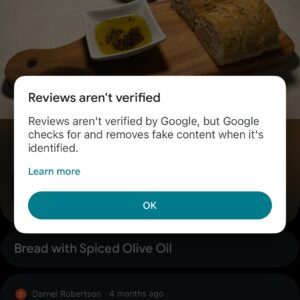
Why This Matters for Your Business
If you’ve been selectively requesting only positive reviews, otherwise known as review gating, offering incentives like discounts or products, or working with vendors to buy reviews, you may already be on Gemini’s radar. Google is watching. And now, they’re watching smarter.
Examples of What to Avoid
- Do not offer existing customers a free or discounted service in exchange for a five-star review.
- Do not reach out to customers who left a negative review with offers of a refund or gift card in hopes they’ll change it.
- Do not send review requests that first ask if the customer was satisfied and only give those who respond positively a link to leave a review.
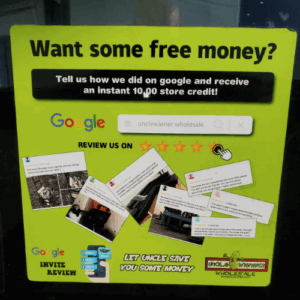
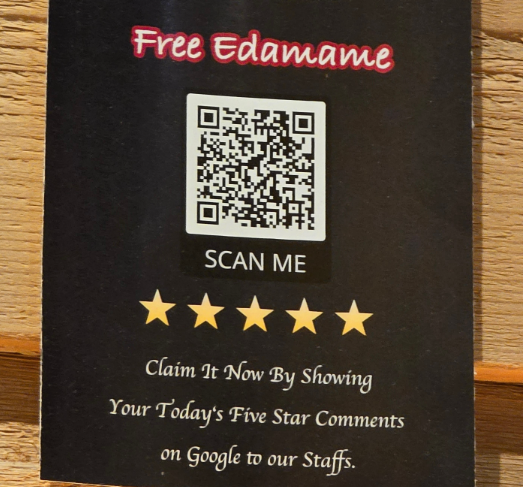
What Should You Do?
Now more than ever, it’s critical to:
- Audit how you request reviews—ensure no filtering or selective outreach.
- Avoid any appearance of incentives or pressure.
- Monitor your profile closely for any unusual review activity.
- Work with honest platforms like Reputation Arm to organically engage your existing customer base and target them at the right time for the best review conversion.
As Google continues its rollout of Gemini’s enforcement capabilities, expect more public consequences for businesses caught gaming the system.
Stay transparent. Stay compliant. Or risk getting flagged—by AI.
